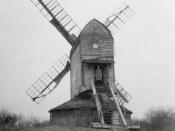In 1859, John Stewart Mill wrote On Liberty. In it, he laid out the ethical foundation of democratic individualism. At the same time, Mill considered the circumstances under which individual liberty might be justifiably restricted. Under what has come to be known as the harm principle, Mill stated that a person's liberty may justifiably be restricted only in order to prevent harm that the person's actions would cause to others.
"Over himself, over his own body and mind, the individual is sovereign." Mill's defense against paternalism lies primarily on the concept that individuals have a better idea of what is good for them than the government or any one else for that matter. Mill has no objection to governments interfering to prevent citizens from harming each other; indeed he believes this is the only situation in which intervention is justified and invited. "The sole end for which mankind are warranted, individually or collectively, in interfering with the liberty of action of any of their number, is ...
to prevent harm to others."
Dictionary.com describes paternalism as "a policy or practice of treating or governing people in a fatherly manner, especially by providing for their needs without giving them rights or responsibilities." To continue further, paternalism is the interference of a state or an individual.
Mill indicates that "... liberty consists in doing what one desires, and he does not desire to fall into the river." He refers to an incidence where an official sees a person about to cross a bridge which has been declared unsafe by the state. Mill supposes that the official has no time to warn the person of the danger of crossing the bridge. At this point, the person is seized and no real infringements of liberty were asserted on the person. This is where...


